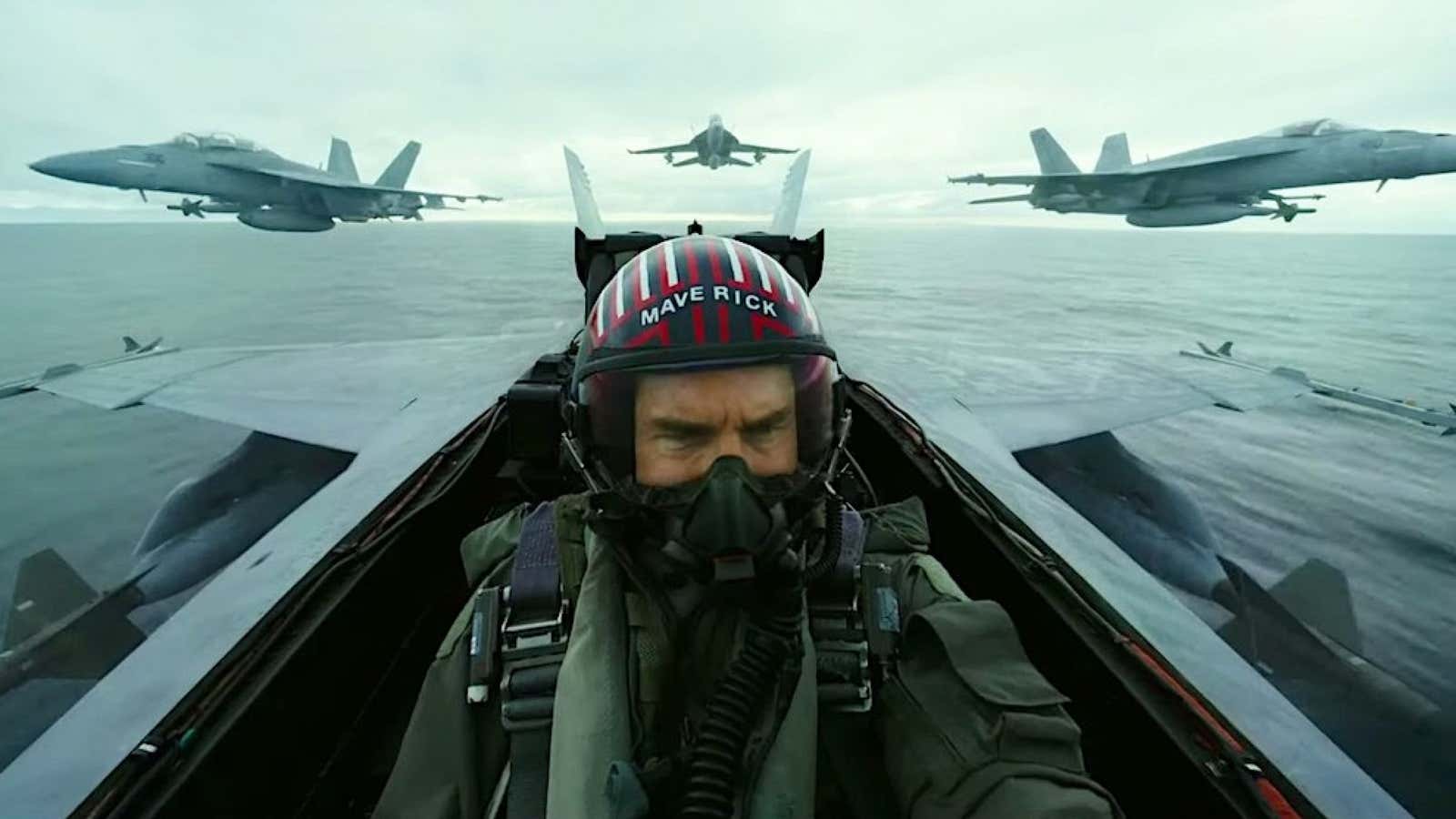Nostalgic, aviator-loving Americans with a “need for speed” have waited three years for the release of Top Gun: Maverick, which hits theaters today after production delays and three pandemic postponements. Box office analysts are expecting a domestic opening weekend of between $98 million and $125 million, which could make Maverick Tom Cruise’s first movie to score a $100 million open.
Cruise fans in China, on the other hand, will have to keep waiting.
While movie release dates between the US and China often differ, Paramount Pictures currently has no plans to show Top Gun: Maverick in China, the Wall Street Journal reports. The Journal’s Erich Schwartzel, who wrote Red Carpet: Hollywood, China, and the Global Battle for Cultural Supremacy, also reported that in 2019—when Maverick was first slated for release—Chinese tech giant Tencent backed out of a 12.5% investment in the film over fears that Communist Party officials would disapprove of their involvement in a movie lionizing the US military. In Maverick, Cruise reprises his role as Navy pilot Pete “Maverick” Mitchell to join a combat mission in an unidentified country.
Top Gun: Maverick has long dealt with the specter of Chinese censors. When a trailer for the movie premiered in 2019, viewers noticed that Cruise’s iconic leather jacket was altered: A patch that in 1986 included the Japanese and Taiwanese flags now featured vague facsimiles of them. Schwartzel reports that the change was suggested by a Tencent financier on the movie, though the original flags seem to have made the film’s final cut.
How US studios change movies for China
Given the increasing importance of Chinese audiences to the global box office, US studios are becoming accustomed to making adjustments if they hope to get past censors. In 2008, a list published by China’s State Administration of Radio, Film, and Television included 19 rules movies must follow to be shown in the country, and accounting for them leads to some interesting tweaks. Courtesy of Schwartzels’ Red Carpet (which is extremely worth reading in full):
- In Pirates of the Caribbean: At the World’s End, which starred Chow Yun-Fat in the role of a ship captain, scenes that featured the Chinese actor were later cut because he played an evil force.
- When Sony was preparing Men in Black 3 for China in 2012, they had to nix the neuralyzer—that pen-like device MIB agents use to wipe witnesses’ memories. “In a country where officials control how history is remembered, “Schwartzel writes, “the memory-erasing device became a metaphor for authoritarian control.”
- In 2017, Warner Bros. recut Stephen King’s It twice to try to get it into China, which doesn’t allow movies that feature ghosts. One recut included adding text at the beginning that explained the clown was an alien from outer space, but the movie still wasn’t approved.
- Chris Pratt’s bare butt was taken out of Passengers.
But censorship is only part of the story. It’s been 36 years since the first Top Gun was released, and in that time the power dynamic between the US and China when it comes to movies has shifted dramatically, as has the overall vibe between the two countries.
In 2020 and 2021, China’s was the biggest box-office in the world, as many theaters in the US remained closed. This year, the US appears set to retake the crown, but it’s a tight race: Gross revenues for 2022 to date stand at $2.38 billion for North America and $2.43 billion for China, according to ComScore.
Meanwhile, a roughly 30-year period in which US films took off in China—Titanic alone accounted for 20% of China’s box office in 1997—is drawing to a close as local studios push more homegrown productions. The fastest film to surpass $500 million at the Chinese box office was 2017’s Wolf Warrior 2, which follows a Chinese soldier who takes on a special mission in an unidentified African country.
